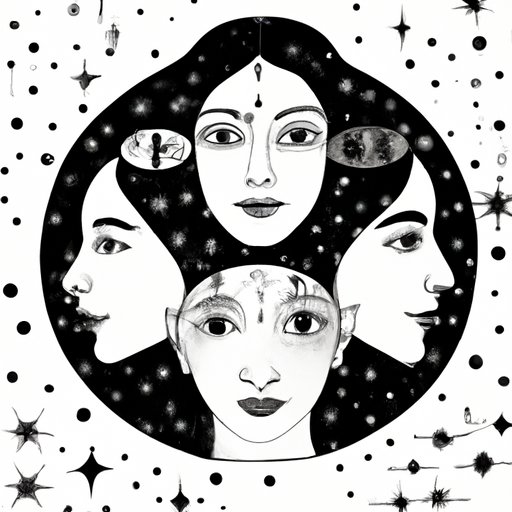I. Introduction
Horoscopes have been around for centuries and continue to fascinate millions of people worldwide. Whether it’s reading your daily horoscope online or having a professional astrologer create a personalized chart, understanding your astrological sign can provide insight into your personality, relationships, and future. In this article, we’ll explore the intricacies of horoscopes, from their origins to their significance in modern-day society.
II. The basics of horoscopes: understanding what they are and how they work
A horoscope is a diagram or chart that represents the position of the sun, moon, and planets at the moment of someone’s birth. The interpretation of this chart is based on the principles of astrology, which posits that celestial bodies have an influence on the events and behaviors that occur on earth. Understanding horoscopes requires a fundamental understanding of how astrology works, including the role of astrological signs, planets, and houses. Additionally, there are different types of horoscopes, such as daily, weekly, monthly, and yearly, each with a unique purpose and focus.
III. The significance of horoscopes in modern-day society
Horoscopes have a significant influence on popular culture, with millions of people checking their daily horoscope on social media and entertainment websites. For many, horoscopes provide a framework for decision-making and assist in gaining insight into themselves and others. Despite criticisms and skepticism about their accuracy, horoscopes continue to attract a large following in contemporary society.
IV. The history of horoscopes: from ancient origins to modern-day interpretation
The study of astrology and horoscopes can be traced back to ancient civilizations, including Egypt and Mesopotamia. Throughout history, there have been different schools of astrology, with variations in interpretation and principles between cultures. Western astrology, for example, is distinct from Vedic astrology, a system based on ancient Indian texts. Over time, the study and interpretation of horoscopes have evolved, with modern practitioners combining ancient principles with contemporary techniques.
V. Why do people believe in horoscopes? An exploration of astrology and psychology
Horoscopes appeal to a broad range of psychological motives, including the human desire for self-understanding and meaning-making. The impact of astrology on human behavior has been the subject of scientific study, with mixed results. Nevertheless, astrology remains a popular form of divination, with many claiming that it offers a unique insight into our lives and the universe at large.
VI. How to read your horoscope: decoding the symbols and meanings
Interpreting a horoscope involves identifying one’s astrological sign, along with the significance of planetary transits and positions. Understanding the basics of astrology can assist in making sense of the symbols and meanings associated with a horoscope chart. Additionally, keeping an open mind and trusting one’s intuition is recommended when deciphering the complex layers of meaning inherent in astrology.
VII. The science behind horoscopes: separating fact from fiction
The scientific validity of horoscopes is a topic of debate within the scientific community. Some research suggests a correlation between astrological signs and personality traits, while others question the accuracy of these findings. Regardless of the scientific evidence, astrology can provide valuable insight into personal growth and self-awareness, with many using horoscopes as a tool for understanding themselves and their place in the world.
VIII. Conclusion
In conclusion, understanding horoscopes and astrology requires an open mind and an appreciation for the complexity of these systems. While skepticism and criticism of horoscopes persist, their popularity across cultures and time speaks to their enduring appeal. By exploring the history, science, and symbolism of horoscopes, we can better understand ourselves and the universe we inhabit. We encourage readers to continue exploring these fascinating systems and to make their own judgments about their significance.
